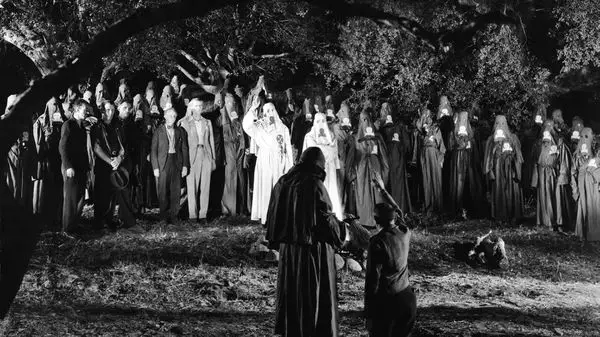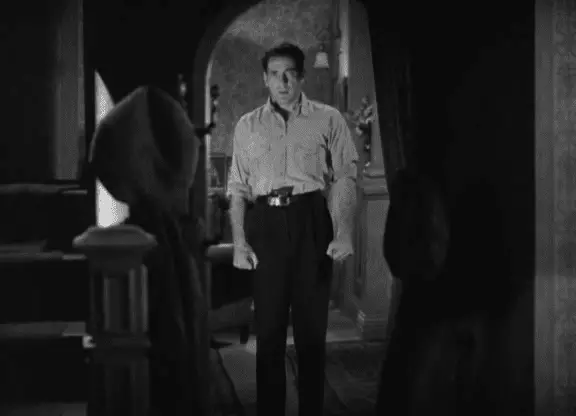Black Legion is a 1937 propaganda film that’s not precisely a propaganda film but is one hundred percent a propaganda film. The reason is that early on during the rise of the Third Reich, Warner Brothers vowed not to make propaganda films, choosing instead to make “message” films. So the result is an early Humphrey Bogart movie with the message that racism is bad and Klan adjacent organizations are evil and un-American.
Many of the shortcomings of Archie Mayo’s film can be attributed to the cowardly and overtly ridiculous Production Code. For example, the way Ambel Finkel and William Wister Haines side-step showing anti-semitism or depicting how institutions, both federal and state, are often populated by members of organizations like the Black Legion, stems from the Hays office wanting to distance what was going on in the USA with what was going on in nazi Germany.

In other words, the head of the Production Code, Joseph Breen, wanted to keep the parallels to a minimum. They even went so far as to replace Warner Brother’s initial casting of Edward G. Robinson because he looked “too European.” Enter Humphrey Bogart, who, while familiar to audiences of that time, was more famous for playing heels who, while memorable, were rarely the lead.
Ironically the casting of Bogart as Frank Taylor would be all the more impactful, as Bogart has a working-class appeal to him, which makes Frank all the more believable. Frank Taylor is a working-class stiff who is passed over for a promotion. The promotion instead goes to Joe Dombroski (Henry Brandon), a Polish immigrant who is seen studying during breaks, going to night school, and even designing a more efficient oiling system for the factory.
Finkel and Haines’s script is ripped from the headlines. Unfortunately, there was an organization called the Black Legion, and the story of Mayo’s film largely dramatizes their downfall.
Mayo, Finkel, and Haines show how easy it is to think you’re getting a promotion and somehow miss the obvious choice. Frank has worked for the company almost longer than anyone, and he’s a good worker; even Dombrowski thinks he’d make a good foreman. But once he discovers he doesn’t get the promotion, his self-esteem, like any of ours, takes a hit.
Frank takes feeling sorry for himself to the extra level of trying to find someone to blame rather than accepting that maybe Dombrowski is better for the job or plain old bad luck. Instead, Frank hears a radio program about “Real Americans” and how “immigrants are stealing jobs.” Suddenly, Frank finds himself talking to Cliff (Joseph Sawyer), whose words resemble the du jours of YouTube.
Interestingly, until he loses the promotion, Frank, along with the rest of the workers, writes Cliff off. “Every time I say anything, you always want to start an argument. What is it?” “Don’t be discouraged. Keep Trying. Maybe someday you’ll say something that makes sense.” Cliff is a loudmouth, lazy, and ignorant; everyone from Joe Dombrowski to Ed Jackson can see it.

Ed rents a room from the Grogans, an Irish family who live next door to Frank. The Grogan patriarch, Mike (Clifford Soubier), works with Frank and Ed at the factory. Mike’s wife, Mrs. Grogan (Dorthy Vaughn), and their daughter Betty played by the fabulous Ann Sheridan, help out Frank’s wife, Ruth (Erin O’Brien-Moore), whenever possible. So naturally, Betty has eyes for Ed, but Ed is too busy drinking and staying out with Pearl Danvers (Helen Flint) to notice how lucky he is to have a gal like Betty waiting for him.
At first, Frank is on top of the world after joining the Black Legion. Even oblivious, Ed notices how much happier Frank seems. Ed is the mirror version of Frank; he drinks, stays out late, and is not the best worker. Yet, even Ed knows why Dombrowski got the job and, more importantly, knows Cliff is to be mocked and ignored.
Finkel and Haines’s script shows how co-workers can often become a support group unto themselves, building a tight-knit community. A community that Cliff seems not to be a part of. Frank’s quick descent into the Black Legion alienates him and drives him further toward his tragic fate.
Frank eventually gets the foreman job after he and the rest of the Black Legion break into Dombrowski’s farmhouse, beat him and his father, put both onto a train car, and burn their farm to the ground. But Frank loses the promotion as quickly as he gets it because he spends more time trying to recruit people for the Black Legion than working–gotta get those numbers up, fellas! Soon, Mike gets the job and feels terrible about Frank losing it. Unfortunately, so does Frank, so he and the rest of the Black Legion kidnap Mike and whip him.
One of the more fascinating aspects of Black Legion is how adroitly it shows that hate organizations often moonlight as grifting outfits. In a darkly comic scene, after Frank has gone through all the cloak and dagger pageantry and oath-taking -at gunpoint- the leader of the Legion tells him to pay up essentially. “We’ll issue to you your Black Legion uniform for the nominal sum of $6.50. Those of you who do not own a revolver will place your orders at the Office of Ordinance for the Black Legion Special, a regular $30 revolver for the small sum of $14.95.” Shipping fees, I gather, are not included.
We even have a scene of the organizers discussing enrollment numbers and how to beef them up and go national so they can rake in the dough. “Don’t forget the millions we were all set to make on Oil Explorers Incorporated before the District Attorney started sniffing around.” It’s only one scene, but it highlights how often organizations like these double as a money-making scheme, often more important as the hate-mongering aspect.
Mayo and cinematographer George Barnes give us one moment so good it makes up for the film’s vastly overwhelming mediocrity. In the scene, Frank brings home a gun. Bogart’s face is a mixture of awe and marvel as he holds the powerful tool.
He stands before a mirror, gun in his pants, and plays quick draw with his reflection. A moment that calls to mind Robert DeNiro’s infamous scene in front of the mirror in Martin Scorsses’s Taxi Driver. The scene is unnerving, mainly because of Bogart’s face, arguably one of the best mugs in cinematic history. No words are spoken, just Bogart’s Frank staring at what he has become, the old Frank rapidly vanishing. Look closely, and you’ll see a tinge of sadness in Bogart’s eyes as if he knows this is the wrong path and yet feels powerless to stop it.

Since Frank commits immoral acts, the Code mandates he must be punished. This in of itself is not that bad; Frank should be punished; he’s a violent bigot, his remorsefulness be damned. Still, the ending is perhaps too neat and tidy, with Frank and the rest of the Black Legion being brought to justice, complete with an impassioned speech by Bogart on the stand confessing to his crimes.
George Barnes’s camerawork keeps the pace of Black Legion lively. Though Mayo’s direction is never all that interesting, there are moments when the film comes to eerie life. More likely, this results from Micahel Curtiz, who worked on the film as a co-director, uncredited.
Whoever is responsible, Black Legion has moments, such as the shot of all the members lined in a row, their black robes reflecting the flames of the fire, symboling the hell Frank is about to enter, are eerie and nightmarish. However, it’s when Barnes’s camera moves that gives Black Legion so much of its documentary feel, such as the camera following the workers out of the warehouse or observing them sitting around on break.
Black Legion is no Casablanca. Mayo’s direction is largely pedestrian, and his staging is often rote, with Barnes’s camera doing a lot of heavy lifting. The message often overwhelms any of the drama Mayo, and the script is trying to bring to life and often suffocates it. Instead, the little moments make Black Legion stick in my mind. There’s an immediacy to Mayo and Barnes’s staging, a rooting in place and time, that gives it a feel of authenticity at once while also being a relic from a bygone era.
An era that is not as bygone as we would like.
Images courtesy of Warner Bros.
Have strong thoughts about this piece you need to share? Or maybe there’s something else on your mind you’re wanting to talk about with fellow Fandomentals? Head on over to our Community server to join in the conversation!

